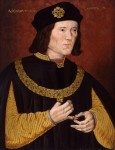 Okay, it’s not that early. I just couldn’t resist mooching from Shakespeare for obvious reasons. This is your official History Blog wakeup call: one hour from now the St. Louis University colloquium on the excavation and identification of the remains of King Richard III kicks off. Station yourself on the R3@SLU website to watch the event streaming. Geneticist Dr. Turi King and the dig’s fieldwork director Matthew Morris will be on hand to discuss the find along with history, humanities, forensic pathology and English professors from SLU.
Okay, it’s not that early. I just couldn’t resist mooching from Shakespeare for obvious reasons. This is your official History Blog wakeup call: one hour from now the St. Louis University colloquium on the excavation and identification of the remains of King Richard III kicks off. Station yourself on the R3@SLU website to watch the event streaming. Geneticist Dr. Turi King and the dig’s fieldwork director Matthew Morris will be on hand to discuss the find along with history, humanities, forensic pathology and English professors from SLU.
The colloquium lasts six hours but they will break for nature and lunch, so you probably won’t have to use that Snapple bottle you haven’t recycled yet. Alternatively, you could just wait for the entire video to be uploaded to the site after the discussion is over. Dr. Jonathan Sawday from the St. Louis University English department and one of the organizers of the event, was kind enough to comment on the first post to assure us that the video will be available, and the site now confirms it will be found on the Schedule page.
Right now that page contains the actual schedule. Matthew Moris and Turi King will be on in the afternoon, but don’t skip the St. Louis University talks because it all looks like gold, Jerry. There’s something for everyone. As I am also a forensic pathology nerd, I am very much looking forward to Dr. Michael Graham discussion of Medico-legal Death Investigation: Now and Then.
I’ll be watching today, updating this post with any nerdy commentary as the proverbial spirit moves me. Join me in the comments, if the proverbial spirit moves you. :boogie:
And we’re on! It’s cool to hear to the perspective of Leicesterians from Dr. Sawday.
Oh hey, I didn’t know Sir Walter Scott invented the term “War of the Roses.”
Archaeologist Thomas Finan: Leading a dig is “less of an Indiana Jones experience and more of an Eisenhower experience.” Nicely put.
Dammit, the stream has stopped for me. :angry: Okay it’s back. I missed a chunk of Dr. Finan’s presentation about his finds in the UK which I will catch up when the full video is uploaded.
Archaeologists see an unidentified skeleton as a sample of the wider population, a source of information about the population’s health, age, diet, physical attributes, etc. The individual’s cause of death is not often writ on the skeletal remains. If they’ve died of disease or old age or a sudden heart attack, say, you’re not going necessarily going to find evidence of that on the bones.
Now that the recovery of ancient DNA is possible, it opens the door to a whole new investigation into the remains as an individual rather than as a source of data for the wider population.
It’s pathology time! Ooh, interesting that China was doing forensic death investigations in the 13th century.
The coroner’s office was established in England in the 8th or 9th century. That is crazy. They didn’t include autopsies until much later, however, so even if Richard’s death had been investigated, his body would have been looked at but nothing more.
The US is still under the coroner system today. Frontline did a fantastic and terrifying expose’ of what a slapdash disaster death investigations can be in the United States. You can watch that program online on the PBS website and I highly, HIGHLY recommend it.
The choppiness is getting me down, y’all. I might have to wait for the finished video.
Stab wound with hilt mark and hesitation marks on the wrist. That slice with the lined up pinpoints indicate a serrated weapon was used, in this case a saw. Wound interpretation is fascinating.
Now there’s what I’m sure is a compelling round table conversation on how archaeologists, curators, etc. handle human remains in a respectful way but it’s like an audio version of a strobe light and I just can’t take it anymore. I’m giving up for now, but I’ll try again regularly.
Huh. They seem to have gone back to Dr. Finan’s presentation and it sounds and looks fine. I’ll take it!
Okay, it appears they used the break to replay the presentation that was so choppy. Now it’s back to the live colloquium with Dr. Anthony Hasler’s talk Richard’s World. There are still some moments when the stream has to catch up with itself, but that constant choppiness has cleared up.
Spoke too soon. The choppiness is back.
Okay it’s 1:20 EST and they’re replaying Anthony Hasler’s presentation during the lunch break. The replays all seem to be work well, which means the final video will be good quality.
…. Aaand choppiness again. I’m officially conceding defeat. I’ll try again after lunch.
It’s 2:34 EST and Matthew Morris is up. The stream still stutters. I’m going to go ahead and wait for the completed video. :skull: